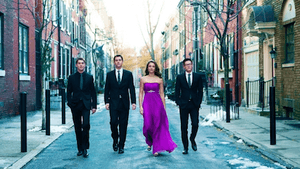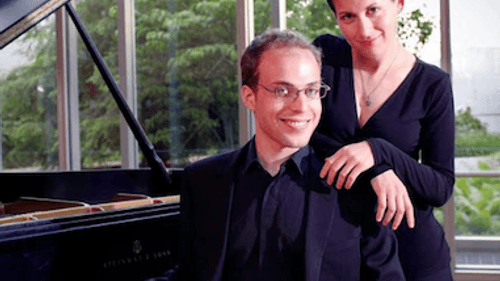Stay in the Loop
BSR publishes on a weekly schedule, with an email newsletter every Wednesday and Thursday morning. There’s no paywall, and subscribing is always free.
Four on the concert floor
A four-show sampler from Philadephia Chamber Music Society and 1807 & Friends

Vagaries of the scheduling process sent me to four concerts last week: three presented by the Philadelphia Chamber Music Society and one by 1807 & Friends. This mix was a good example of the variety and unpredictability Philadelphia's chamber music scene offers its devotees.
PCMS presents the Dover Quartet
The Dover Quartet pursued a hidden agenda when they revised the program for their appearance with the Philadelphia Chamber Music Society (PCMS). They were originally supposed to play two string quartets and present the Philadelphia premiere of Edgar Meyer’s 1995 quintet for bass and string quartet, with Meyer himself playing the bass. Instead, they opened with a Mozart divertimento arranged for five strings, followed it with a Rossini duet for cello and double bass, and ended the first half with Dvorak’s “American” quartet. Then they played Meyer’s quintet after the intermission.
The agenda became clear when you heard Meyer’s quintet. The other pieces all related to it in some way. The Mozart is, of course, a classic string quintet. Cello and bass engage in some comic interplays in the Rossini duo, and cello-bass conversations play an important role in Meyer’s second movement. In other places you could hear the kind of viola and second violin harmonies that give the Dvorak its distinctive sound.
Meyer’s quintet has become a popular item on the chamber music circuit even thought it’s never been heard here. It’s a freewheeling mixture of straightforward chamber music, playfulness, and solemnity. The third movement plays like a visit to a military cemetery, starting with drawn out trumpet calls produced on the cello and viola.
PCMS presents Colin Carr and Thomas Sauer
The most unusual was a set of four pieces by Benjamin Britten and Thomas Adès presented by cellist Colin Carr and pianist Thomas Sauer. PCMS advance notices described the four as works “rarely (if ever) heard.” Adès’s name didn’t ring a bell but he’s a prolific 45-year-old British composer whose operas, symphonies, and other works have consistently been premiered by major musical organizations.
The audience for that event wasn’t as large as at most PCMS events, but they got their money’s worth. The two cello pieces by Britten possessed all the humanity and musical inventiveness that run through his entire output. Adès’s Traced Overhead for solo piano is a rather abstract piece; his "Lieux Retrouvés," on the other hand, paints musical landscapes that vividly depict water, mountains, fields, and urban bustle.
1807 & Friends
The first concert on my agenda was a Monday night visit to the 1807 & Friends chamber series. The Friends finished their concert with a moving performance of a standard Brahms quartet but their first half was just as eclectic as Dover’s.
They opened with the premiere of a short, harmoniously melodic "Spring Dance" for string quartet by New Jersey composer Frank James Staneck. Their guest, guitarist Allen Krantz, then played a quiet solo, "An Alm for the Love of God," composed by an aging guitarist who had seen a lot of the world.
The next entry, Song for Peace, was a collaboration between cellist Lloyd Smith and the junior high school students in the Young Composers Workshop at MMI Preparatory School in Freeland, Pennsylvania. The students created musical ideas expressing their feelings about the San Bernardino shootings, and Smith arranged their ideas into an orchestral piece and a quintet for strings and guitar. The quintet version was a touching work with deep harmonies and a flash of violence in the middle.
The first half finale was one of Boccherini’s best quintets for guitar and string quartet. The guitar plays a supporting role in most of Boccherini’s guitar quintets. In this one, its distinctive voice colors every movement, adding gallantry when the strings turn autumnal and reinforcing the courtliness of the minuet movement.
PCMS presents Anna Polonsky and Orion Weiss

I ended my musical week with one of the most appealing forms in the chamber music repertoire — the duet for four hands and one piano. I’ve always felt there is something inherently attractive about the sight of two people sitting at a piano making music together, and Anna Polonsky and Orion Weiss reinforced my bias. I would have preferred a lighter touch in the Mozart sonata that opened their PCMS program, but it was still a pleasure. When you have four hands working the keys, all voices stand out. You can hear things like a Mozartian horn call in the lower side of the keyboard answering a horn call on the higher side.
The Philadelphia premiere on this program was a sonata the veteran American composer Stephen Hartke wrote for Polonsky and Weiss in 2014. It includes a second movement that captures the dance-like qualities of four-handed piano work; a dreamy pastorale that has each pianist playing with one hand; and a final tolling, clanging celebration.
The final items on the program were originally played by duos that included Clare Schumann. In Robert Schumann’s set of six impromptus, Bilder aus Osten, Polonsky and Weiss captured all the emotions, including a gently satisfying contentment, that make me look forward to any Schumann piece listed on a program. The finale, Mendelssohn’s Andante and Allegro Brillante, ended the program with the music Clare Schumann and Mendelssohn played at the Schumann’s wedding. The associations attached to the two pieces summed up much of the spirit of the afternoon.
What, When, Where
1807 & Friends. October 17, 2016 at the Academy of Vocal Arts, 1920 Spruce St., Philadelphia. (215) 438-4027 or 1807friends.org.
Philadelphia Chamber Music Society: Works for cello and piano by Benjamin Britten and Thomas Adès. Colin Carr, cello. Thomas Sauer, piano. October 20, 2016 at the American Philosophical Society, 427 Chestnut St., Philadelphia.
Philadelphia Chamber Music Society: Works by Mozart. Rossini, Dvorak, Meyer. Eugene Meyer, double bass. Dover Quartet, string quartet. October 21, 2016 at the Perelman Theater, Kimmel Center for the Performing Arts, 300 S. Broad St., Philadelphia.
Philadelphia Chamber Music Society: Piano works for four hands by Mozart, Hartke, Schumann, Mendelssohn. Anna Polonsky and Orion Weiss, piano. October 23, 2016 at the American Philosophical Society, 427 Chestnut St., Philadelphia. (215) 569-8080 or pcmsconcerts.org.
Sign up for our newsletter
All of the week's new articles, all in one place. Sign up for the free weekly BSR newsletters, and don't miss a conversation.
 Tom Purdom
Tom Purdom